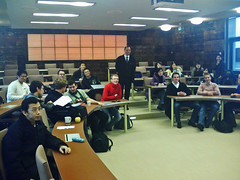Hamburg.
Marc Schwieger's talk at Alcatel-Lucent Foundation / HBI 2009 is followed by a panel discussion with Marc, Martin Hoffmann from MME Moviement, and Martin Krapf from IP Germany. Krapf begins by noting that even the $70m in product placement advertising in James Bond movies remain a small component of all advertising; this is no revolution in advertising yet. While product placement will certainly grow, conventional advertising will continue to be the leading form. Indeed, product placement is most effective when combined with conventional advertising.













